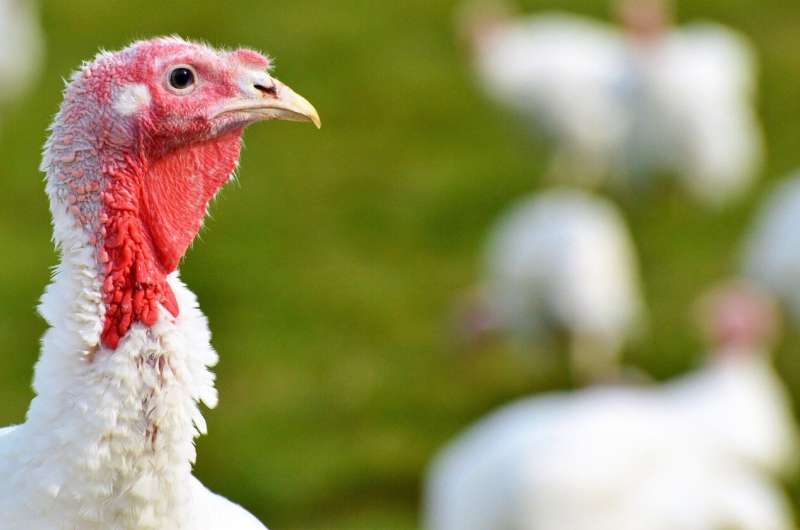Credit: Pixabay/CC0 Public Domain
This week, tensions between the fowl and one U.S. Postal Service worker reached a violent climax when the carrier killed a turkey while on duty, officials said, prompting an investigation by the California Department of Fish and Wildlife.
"On Monday, one of the mail carriers actually had some kind of a stick or something in his vehicle," said Capt. Patrick Foy, a spokesman for the department's Law Enforcement Division. "And when one of the particularly aggressive male turkeys attacked him, he smacked it and killed it."
Foy declined to say what kind of violation could be involved but said the department had not issued a citation as of Thursday evening.
"Our job is to determine what exactly happened and then we fill out a report," he said. "We might send it to the district attorney and the district attorney decides whether or not a crime has been committed."
The postal service said it is investigating the incident, noting in a statement that employees "have had several altercations with aggressive turkeys in the area, including a recent attack on a letter carrier."
"We have been working with the Department of Fish and Wildlife to mitigate the issue," the USPS said. "However, this allegation is alarming, and if true, is inexcusable and does not reflect the efforts of our more than 650,000 employees who faithfully serve and deliver for America every day."
So far, the Department of Fish and Wildlife's investigation into the incident has revealed strange details about the area's turkeys and their behavior and treatment.
Investigators found that some residents had been feeding the turkeys "copious quantities of food", which is prohibited in California and could be a factor in the birds' aggressiveness.
"It probably contributed to the massive size of the turkey in question because it was eating just an unlimited amount of food every day from this particular household," Foy said. "We are addressing that issue as a major contributing factor to this overall problem."
The turkeys seem to have been targeting delivery workers in the neighborhood since October, when the postal service began reporting the situation to wildlife officials. Foy said the attacks had also disrupted deliveries from FedEx, UPS and other carriers.
Turkey attacks on humans are rare, Foy said, but are most often attributed to mating season, which occurs in April—so it "didn't really make sense that … they would be so aggressive back in October."
A wildlife officer and a biologist sent to look into the reports saw a group of four turkeys attack a mail carrier.
"He was swinging his mailbag at them, trying to fend them off," Foy said.
Foy said the department informed mail carriers that they were allowed to defend themselves and suggested the use of pepper spray, which postal service workers are allowed to carry.
"They said, 'Yes, we've been pepper-spraying them. We have been swinging our mailbags at them. We've been kicking them and they still continue the attack,'" Foy said.
Wildlife officials then tried and failed to capture the most aggressive of the birds.
After a temporary reprieve, the birds renewed their attacks in the last few weeks, and the postal service again reached out to wildlife officials.
Foy said the turkey that was killed Monday was by far the heaviest he had ever lifted.
"I've been around about 25 years, so I kind of know turkeys," he said. "And I just I looked at it, and I'm like, 'Oh, this is the biggest turkey I've ever seen.' "
Even more odd was the fact that the birds seem to spare the neighborhood's residents and non-delivery personnel from their wrath.
"I can't explain it, but the aggressive turkeys do not appear to be worried at all about the residents of this community," Foy said. "I watched it myself.
"I walked up to the turkeys myself, and they didn't want anything to do with me," he said. "But when that mail carrier pulled up, they immediately went on the offensive."
©2022 Los Angeles Times.
Distributed by Tribune Content Agency, LLC.





















